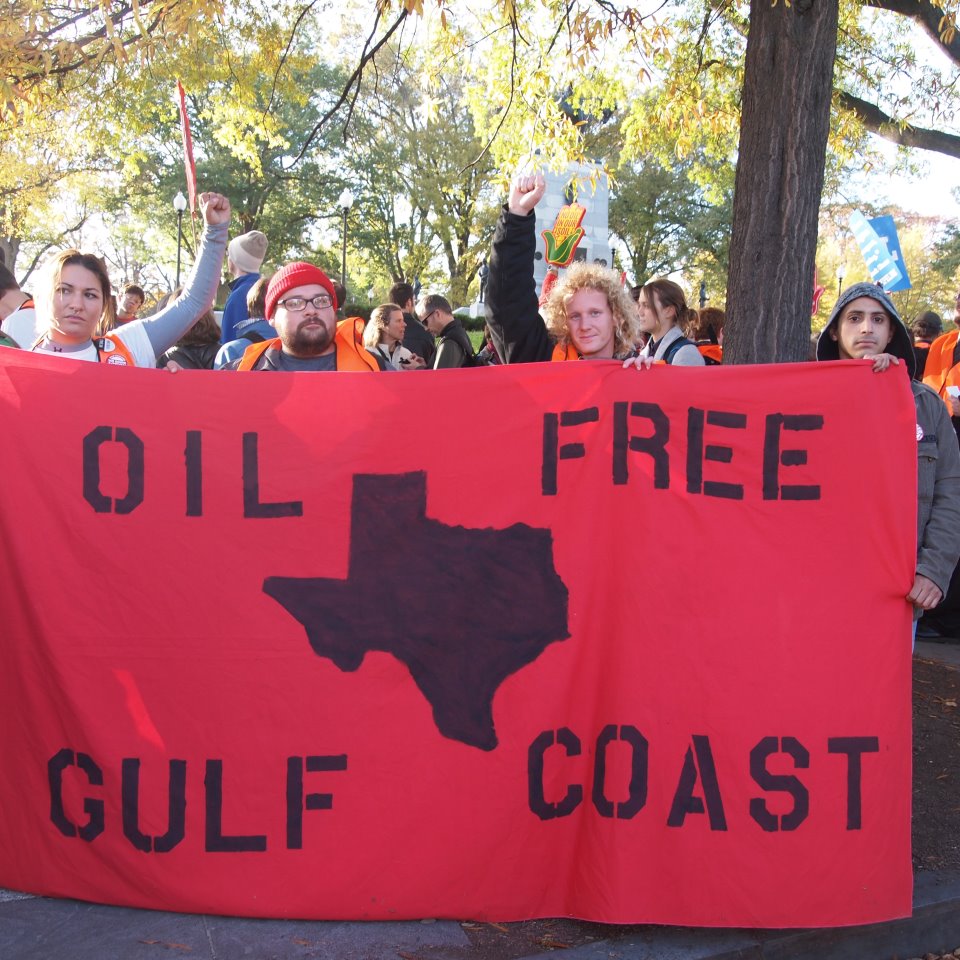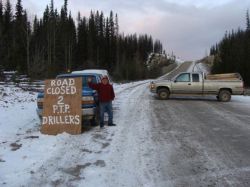by Deep Green Resistance News Service | Jul 16, 2012 | Mining & Drilling, Obstruction & Occupation
By Laurie Tuffrey / The Guardian
Greenpeace activists shut down 74 Shell petrol stations in Edinburgh and London in a protest against the company’s plans to drill for oil in the Arctic that saw 24 campaigners arrested on Monday.
The campaigners are attempting to shut off petrol to London’s 105 Shell stations and Edinburgh’s 14. Seventy-one have been closed in London and three in Edinburgh.
There have been 24 confirmed arrests, 18 in London and six in Edinburgh. The police in Edinburgh have reportedly parked cars outside all Shell stations across the capital.
Protesters have scaled the roof of the Shell station on Queenstown Road near Battersea Park in London and on Dalry Road in Edinburgh, with police and fire crews attending the scene in Edinburgh.
Activists arrived at the Battersea Park branch at 6.45am and used the station’s barriers to close down the forecourt. They have since covered the Shell sign with a Save the Arctic banner and positioned a life-sized polar bear model on the station’s roof.
The activists are shutting down the stations by using an emergency shut-off switch to stop petrol going to the pumps and then removing a fuse to delay it being switched on again. The organisation has since posted a picture of an activist posting one of the fuses to Shell’s head of Arctic drilling, with the message: “We’re being careful not to destroy property. Even the carefully removed components will go back to Shell.”
The protest is part of Greenpeace’s Save the Arctic campaign, which is aiming to prevent oil drilling and industrial fishing in the Arctic by having the region recognised as a world park. The organisation understands that Shell is going to begin drilling in the Alaskan Arctic in the coming weeks, with the Russian oil company Gazprom also due to work in the region.
The campaign group’s website is running a TV talkshow-style live broadcast covering the protest and showing interviews and videos about the Arctic campaign.
Sara Ayech, a campaigner at the Battersea Park station, said: “It’s time to draw a line in the ice and tell Shell to stop. That’s why today we’re going to shut down all of Shell’s petrol stations in the capital cities of London and Edinburgh. We’ve got dozens of people who will hit over 100 Shell garages throughout the day.”
Graham Thompson is another campaigner who helped shut down the station: “The staff were very pleasant and very reasonable. Obviously they’re not entirely happy about what’s going on but they’ve responded in a very civilised way.
“Obviously, we need to ratchet up the pressure, we need to let Shell know that this isn’t just a publicity campaign, we’re going to put pressure on them until they agree to stop what they’re doing,” said Thompson, commenting on future plans.
Read more from The Guardian: http://www.guardian.co.uk/environment/2012/jul/16/greenpeace-activists-shell-petrol

by Deep Green Resistance News Service | Jun 27, 2012 | Biodiversity & Habitat Destruction, Colonialism & Conquest, Indigenous Autonomy, Obstruction & Occupation
By Amazon Watch
Indigenous peoples affected by the controversial Belo Monte dam complex now under construction along the Xingu River in the Brazilian Amazon have occupied a coffer dam that cuts across channels of the river since last Thursday June 21. Warriors from the Xikrin and Juruna indigenous groups arrived from the Bacajá River and Big Bend of the Xingu River in order to occupy one of Belo Monte’s main dams and work camps, expressing dissatisfaction with the blatant disregard of their rights and the dam building consortium’s non-compliance with socio-environmental mitigation measures. The groups independently organized the action and are demanding the presence of the Norte Energia (NESA) dam-building consortium and the Brazilian government.
The occupiers come from a region of the Xingu downstream of Belo Monte that will suffer from a permanent drought provoked by the diversion of 80% of the river’s flow into an artificial dam to feed the dam’s powerhouse.
The indigenous peoples are outraged that promised actions by government-led Norte Energia – many of which constitute legal obligations of environmental licenses issued for the Belo Monte complex – have not been implemented. According to protest leaders, a program designed to mitigate and compensate impacts of the mega-dam project on indigenous peoples and their territories known as the PBA (Plano Básico Ambiental) has not been presented in local villages as promised.
The protestors also claim that a promised system to ensure small boat navigation in the vicinity of the coffer dams has not been implemented by NESA leaving them isolated from Altamira, a market for goods and the main source of healthcare and other essential services. The interruption of boat transportation along the Xingu is expected to force indigenous peoples to open up access roads to their villages, provoking further pressures from illegal loggers, land speculators, cattle ranchers and squatters.
According to the Xicrin and other indigenous leaders, the coffer dams at Pimental have already compromised water quality downriver on the Xingu due to siltation and stagnation, making it undrinkable and unsuitable for bathing. Norte Energia promised to install wells and potable water distribution systems in indigenous villages, but no such works have been carried out. The protestors at Pimental also point to the lack of legal recognition and demarcation of several indigenous territories in the area of influence of Belo Monte, such as Terra Wangã, Paquiçamba, Juruena do km 17 and Cachoeira Seca, all legal prerequisites for dam construction.
The protestors camping out at the Pimental coffer dam on the Xingu are calling for immediate suspension of the installation license for Belo Monte.
Text written by men assembled in the Bacajá village in the Trincheira-Bacajá indigenous territory declared:
Stop this and let our river run. Let our boats navigate the river. Stop this and let the river run so that our children can drink and bathe in its waters. If they build this dam the river will become ruined, its waters will no longer be good. The river will be dry; how will we be able to navigate and travel?
Let the river run so that our people can continue to hunt in the jungle so that our children and grandchildren can eat, so that the river runs freely and we can fish in the early morning to nourish our children.
Our studies were poorly completed and now you speak of a dam. We do not like this. The Basic Environmental Plan [to mitigate social and environmental impacts] has not even begun to be implemented and they are already building the dam. We do not like this. We want this Belo Monte dam to stop once and for all! (Translation by anthropologist Clarice Cohn.)
From Amazon Watch: http://amazonwatch.org/news/2012/0623-amazonian-indigenous-peoples-occupy-belo-monte-dam-site

by Deep Green Resistance News Service | Jun 26, 2012 | Climate Change, Obstruction & Occupation
By Candice Bernd / TruthOut
The deadline for the review of TransCanada’s permits for the Gulf Coast portion of the Keystone XL pipeline was Monday, June 25, 2012. At the Texas Army Corp of Engineers Galveston office and without any finalization of review, those permits will be automatically granted to the corporation – thanks to President Obama’s announcement that he would expedite the southern leg of the pipeline in Cushing, Oklahoma, back in March.
That’s why Texas climate justice activists, including myself, are officially announcing the Tar Sands Blockade, an epic action that we have been organizing since the beginning of the year. We’re mostly associated with Rising Tide North Texas, and we’re 100 percent prepared to use nonviolent, direct action to block the pipeline’s construction to protect our home.
Bring it, TransCanada
The Tar Sands Blockade will be coordinating nonviolent, direct actions along the pipeline route to stop this zombie pipeline once and for all. We are working with national allies as well as local communities to coordinate a road show that will travel throughout Texas and Oklahoma as well as a regional training effort for activists interested in getting involved in the blockade movement against the Keystone XL.
“Our action is giving a new meaning to ‘Don’t Mess with Texas,'” said Tar Sands Blockade Collective member Benjamin Kessler. Kessler is also a member of Iraq Veterans Against the War.
The permits for the pipeline’s construction are being automatically granted under the Nationwide Permit 12 protocol, or NWP 12. The permits do not need an environmental impact statement to accompany them, according to this process. That very fact alone endangers more than 631 streams and wetlands that the pipeline will cross in our state. Not only that, but the entire Carrizo-Wilcox Aquifer, which supplies drinking water for ten to 12 million homes across 60 counties in East Texas, along the pipeline’s path, is threatened with contamination.
The Keystone XL remains key to the expansion of the Alberta tar sands and leading NASA climate scientist James Hansen has called the pipeline “a fuse to the largest carbon bomb on the planet.” According to Hansen, if the carbon stored in the tar sands is released into the atmosphere, it would mean “game over for the climate.”
350.org founder Bill McKibben has worked hard to get Hansen’s message out to the public and to lawmakers in Washington. After more than 1,200 were arrested during the onset of the Tar Sands Action last fall, another 12,000 turned out to surround the White House to tell President Obama that the Keystone XL is not in the nation’s best interest.
McKibben was elated to hear that the Tar Sands Blockade is continuing to foster the spirit of resistance against the pipeline in the South with the use of nonviolent, direct action.
“Let’s be clear what the drama is here: human bodies and spirits up against the unlimited cash and political influence of the fossil fuel industry. We all should be grateful for this peaceful witness,” McKibben said.
Landowners living along the pipeline’s path say they have been intimidated by TransCanada to sign away the rights to their land, and it’s not just landowners that will lose. The pipeline is expected to destroy indigenous archeological and historical sites – including grave sites – in Oklahoma and Texas.
Read more from TruthOut: http://truth-out.org/news/item/9997-its-time-for-a-texas-tar-sands-blockade

by Deep Green Resistance News Service | Jun 14, 2012 | Education, Indigenous Autonomy, Obstruction & Occupation
Deep Green Resistance will be participating in, and working to raise awareness and support for, the 3rd Annual Unis’tot’en Action Camp in Unis’tot’en territory in the north of Unceded Occupied so-called British Columbia. We seek to stand in solidarity with the Wet’suwet’en and other First Nations in their fight against the exploitation and degradation brought on by the tar sands, including the Enbridge Northern Gateway and other pipelines, fuel terminals, and refineries. Members of Deep Green Resistance will participate in the Action Camp, as well as organize a series of events to raise support and collect donations for the Unis’tot’en Action Camp and the struggle.
Now in its third year of resistance in the ongoing struggle, the Action Camp, which takes place August 6 – 10, will see a lot of activities focused on building solidarity, as well as campaign and action planning for those communities who will stop the pipelines and mining projects that are unwelcome in the First Nations territories. The Lhe Lin Liyin, will stand with strong and uncompromising allies to stop this destruction to protect future generations and biodiversity. In taking this action, we will act in solidarity with those living amidst the horrific damage of the tar sands in northern Alberta, as well as those affected by natural gas & shale oil fracking. The Action Camp is located on the shore of the Wedzin Kwah and the mouth of the Gosnell Creek (km 66 on the Morice River West FSR), tributaries to the Skeena, Bulkley, and Babine Rivers, at the exact location where the Northern Gateway Pipeline, the Pembina Pipeline, the Kinder Morgan Pipeline and the Kitimat Summit Lake Looping Project seek to cross the rivers.
In addition to participating in the Action Camp, we seek to raise support for our allies fighting the pipeline projects. Deep Green Resistance will be planning several events in the Pacific Northwest to raise awareness about the ongoing struggle by the Wet’suwet’en and other First Nations against the colonization and destruction by the fossil fuel industry.
We hope our allies, and allies of the Wet’suwet’en, will join the resistance camp and the fight against industrial extraction.
(out of date fundraising links removed)
From Deep Green Resistance Colorado

by Deep Green Resistance News Service | May 27, 2012 | Obstruction & Occupation
By Tim Groves / Toronto Media Co-op
Environmental justice protestors temporarily shut down a hearing into a proposal to have tar sand oil piped through Ontario. The hearing took place place in London, Ontario, on Wednesday.
The three day hearing, held by the National Energy Board (NEB), is examining a proposal by Enbridge to reverse the flow of an existing pipeline (Line 9), which currently carries imported overseas oil west. Enbridge wants to instead use the pipeline to bring tar sands oil east. This oil may then be exported to Europe.
After entering the hearing, protestors employed the People’s Mic, where the crowd would echo back whatever was said by a spokesperson in order to project their voices. After a few minutes of the People’s Mic commencing, most other attendees at the hearing exited the room. The NEB hearing was shut down for approximately an hour.
The spokesperson who led the Peoples Mic was arrested and then removed from the room. She was later released with a ticket for trespass.
The protestors raised concerns about the environmental impacts of the Alberta tar sands, the possibility of a spill in Ontario and the lack of prior and informed consent being sought from First Nations in Ontario.
“Six Nations rights already have been violated in this review process,” stated Wes Elliot, a resident of Six Nations in a press release. “Free, prior, and informed consent is not a factor in these hearings.”
Line 9 cuts through the Haldimand Tract, land which was deeded to Six Nations in 1784.
“We also must object to the illegitimate and anti-democratic conduct of the officials who are fast-tracking this review,” said Elliot in the release.
Following the protest, demonstrators held what they dubbed an unofficial “People’s Hearing on the Tar Sands Pipeline.”
“The current framework of the National Energy Board hearings does not allow us to draw connections between tar sands extraction, toxic refineries and upgraders, and various other downstream consequences,” said Taylor Flook a member of Occupy Toronto who attended the event in London. “The People’s Hearing was arranged as a more open forum, where anyone can share any of their concerns about relevant issues.”
“The tar sands industry is attempting to build as many pipelines as they can,” said Flook. “We should not accept the fast-tracking of these projects,” she said. “No tar sands operations should proceed without the consent of everyone who may be impacted.”
As the extraction of tar sands from Alberta has increased, a series of new pipeline projects have emerged to bring the dirty oil to refineries and ports across Canada and the US.
The Harper government has loudly endorsed these projects. But following a series of protests against TransCanada’s XL pipeline, which would send tar sands oil south, President Obama delayed approval for a section of the project that goes through the United States until after US elections, which will take place in November.
Opposition by First Nations and environmentalists to Enbridge’s proposed Northern Gateway pipeline, which would bring oil from Alberta to the BC coast for shipment overseas, has garnered attention across Canada.
Protestors worry the Line 9 Reversal could be rushed through before there is time to build awareness and opposition to the pipeline. But they say many of the concerns with the Northern Gateway Pipeline also apply to the Line 9 reversal.
The Line 9 approval process is taking place in two phases. The London hearing deals with bringing oil from Sarnia, Ontario, to Westover, Ontario. The second phase regards oil transport from Westover to Montreal, Quebec.
From The Dominion: http://www.dominionpaper.ca/articles/4482
by Deep Green Resistance News Service | May 7, 2012 | Indigenous Autonomy, Obstruction & Occupation
By Murray Bush / Vancouver Media Co-op
The Musqueam First Nation has vowed to shut down condo construction to protect a major ancient burial site at the Marpole Midden. Infant graves were unearthed by heavy excavating equipment at the Vancouver location this week.
More than 100 Musqueam and supporters marched to the construction project at 1338 SW Marine on Thursday, May 3. The marchers included representatives from several First Nations. Musqueam are now occupying outside the site and say they will remain until protection for the site is assured.
The move to protect their 4,000-year-old village site come after more burials were dug up by the condo developer. Construction stopped six weeks ago when the developer first disturbed intact burials. Musqueam leaders say promised talks with the developer, the city and the province have gone nowhere.
The Musqueam reportedly offered a swap with developer Century Holdings for nearby land, but to no avail. The Marpole Midden is considered one of the most important in Canada and was named a National Historic Site in 1938.
Union of BC Indian Chiefs Grand Chief Stewart Phillip announced that the site will “remain shut down until the province is prepared to come to the table and discuss a resolution to this situation.”
Musqueam Chief Ernest Campbell warned “never question our resolve or the resolve of our fellow First Nations, or of any one else for that matter, when it comes to protecting our sacred burial rights.”
Musqueam spokesperson Cecilia Point said supporters are welcome to come down and join the protest on the sidewalk or bring a tent and stay.
From The Dominion: http://www.dominionpaper.ca/articles/4460




